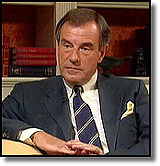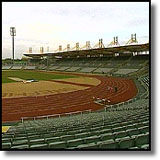
|
Row over Exclusion of Major Sports in Academy RevampA political row has developed over the Government's decision to exclude football, cricket, and rugby from the curriculum of the planned national sports academy.The Conservatives have accused Labour of bias against team games, while senior cricket and rugby figures have criticised the decision. The Culture, Media and Sport Secretary, Chris Smith, said he was ruling them out because they didn't need financial support to achieve high standards. The British Academy of Sport will be eligible for up to a £100 million of lottery money. The Government believes it should be spent mainly for the benefit of athletes from Olympic and non commercial sports.
Dur: 5'52" Mr Smith has told the three consortia bidding for the right to run the Academy it that he wants it to cater only for Olympic and "non-commercial" sports.
"There are other training facilities that need to be put together and developed for other sports. What this must concentrate on is about Olympic sports, about non-commercial sports and about getting the best for our athletes internationally," said the minister. But this is not what the former Prime Minister, John Major, had in mind when he launched his campaign to improve the standard of British sport with the academy as its central plank. The former Tory leader saw it as away of encouraging his favourite sports of soccer and cricket. The Conservatives have criticised the Government's decision, complaining that no sport should be excluded from the academy and citing it as evidence of Labour's hostility to team games. They say the government is having to cut back on the academy because it is spending lottery money in other areas like health and education. The decision was also criticised by Lord MacLaurin, chairman of the England Cricket Board. He said that if his game was not to be covered by the academy then it should be able to have other freedoms, such as being able to negotiate its own television contracts.
"Cricket is not a rich sport. Now, if we are able to negotiate television contracts freely - which we're not able to do at the moment because test match cricket has to be on terrestrial television - then that really does harm our negotiating powers," he said. "Now, if the Government are going to say no, they're not going to help us through the academy and other things, then fine - just take us off the listed events and allow us to negotiate for ourselves for the benefit of our sport," he insisited, adding that ministers "can't have their cake and eat it". For his part, the chief executive of the Rugby League, Maurice Lindsey, said he was very disappointed about a decision he described as ill thought out and bizarre. A decision on where the academy will be sited is expected at the end of next month. There are three possibilities. Sheffield, a consortium of existing facilities in the Midlands and the former American airbase at Upper Heyford in Oxfordshire. Mr Smith inherited the shortlist from the Conservatives, but is now insisting the proposals be changed radically to be acceptable. He has asked the Sports Council and other interested bodies to help ministers modify and finalise the plans: "We have decided to take a grip on the plans and give them a real sense of direction. There has been a lot of dithering up to now, largely as a result of the way the previous government put the thing on the road". Mr Smith's decision to remove the big sports from the equations has already won support from the Sheffield bid. Their spokesman, Dr John Alderson, said: "Professional sport can afford to pay for its own development, whereas the whole emphasis of the British Academy of Sport, being payed for out of lottery money, was that it should be the general public as a whole which should benefit".
|
Diana, Princess of Wales, 1961-1997
Conference 97
Devolution
The Archive
News |
Issues |
Background |
Parties |
Analysis |
TV/Radio/Web
Interactive |
Forum |
Live |
About This Site
News |
Issues |
Background |
Parties |
Analysis |
TV/Radio/Web
Interactive |
Forum |
Live |
About This Site
© BBC 1997 |
politics97@bbc.co.uk |


